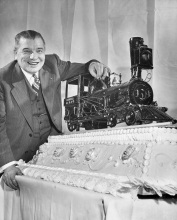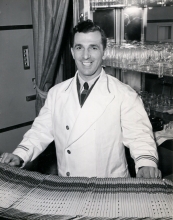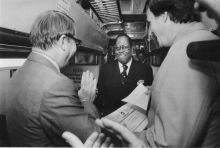Dedication
Dedication Subcategories
No subcategories were found for Dedication.
DEDICATION
As a young boy living in Milwaukee, I was able to befriend a gentleman by the name of Mr. Joseph Verona. Mr. Verona was the Dining Car Manager of the Chicago & North Western Railway (C&NW). Mr. Verona worked in Chicago in the bowels of the Chicago Passenger Terminal but lived in the South Side of Milwaukee. Our friendship that lasted almost 30 years began with letters and eventually led to countless trips to Chicago to visit the C&NW Dining Car & Commissary Department. Over the years I would travel with Mr. Verona aboard C&NW Streamliners from Milwaukee to Chicago and return, to spend the day at the 168 N. Canal Street. The Department was in its last several years of service before its ultimate demise. Through Mr. Verona, I was privileged to experience the remnants of a once proud and vibrant organization that served millions of passengers and employed thousands over its decades of operation. While Mr. Verona was short in stature he was an uncompromising professional who ran an extremely tight ship.
Joseph Verona was born in Hampton, NJ. November 11th 1908 and moved to Milwaukee, WI with his family at the age of two. He grew up Milwaukee’s south side and began his railroad career cleaning passenger coaches at Milwaukee’s lake front Passenger Depot at age 13. Working his way up in the ranks he finally was accepted as an employee of the C&NW Dining Car Department. Mr. Verona began his dining car career with the C&NW as a Dish Washer / Fourth Cook and worked his way up to the Manager of the Dining Car & Commissary Department. His positions within the company also included Steward, Traveling Chef, Dining Car Inspector, and Assistant Dining Car Manager. His travels were over most C&NW passenger routes of the day but worked a very significant period of time on the C&NW – Union Pacific (UP) “City of Denver Streamliner”, Trains #111 and #112.
During his employ with the C&NW he also worked closely with C&NW Railroad Police, the F.B.I. along with State and local police departments in many undercover investigations. In one of the most important cases Mr. Verona, was “on leave” from his position as Dining Car Steward on the City of Denver, where he worked undercover aboard the North Western, Southern Pacific and Union Pacific to uncover wide ranging thefts of monies and products by dining car, lounge car and sleeping car employees. Mr. Verona’s files are filled with letters of commendation from many law enforcement and judicial officials including two personal letters from J. Edgar Hoover. He maintained memberships in St. Jude League of Police, League of American Lawmen, Wisconsin Law Enforcement Officers, Institute of American Food Technologists and the International Association of Arson Investigators. He also was recognized by friends, peers and even several newspapers as an excellent Chef.
While Dining Car & Commissary Department Manager his department won unprecedented awards for safety and health inspections by several external and internal regulatory groups. He was also a cost cutter and but in cutting expenses he never sacrificed department quality. One of his highest accomplishments was building a very trusting and honest relationship with all of his employees He was respected by a majority of his employees and many of them could call him a friend.
One of these employees was a C&NW Head Chef and Commissary Assistant Mr. Leland “Sugar” Cain, Jr. Mr. Cain became Mr. Verona’s right hand man. Sugar is the last known C&NW Dining Car Department employee alive today. I first met Mr. Cain through my many visits to the Commissary in Chicago. While Mr. Cain reported to Mr. Verona, “Sugar” ran the day to day operations in the Commissary portion of the Department. With the Commissary in its twilight of glory, the staff was bare bones and Mr. Cain’s duties were extensive. On those days when I would visit Chicago, “Sugar” and Mr. Verona would cook up a spectacular lunch fit for a king. The Commissary had extensive cooking facilities along with meat lockers, freezers, refrigeration areas, linen room, silver and china room and general stores. “Sugar” gave me a great education on how the department ran and what the department was like during its heyday. He also gave me a good understanding on how much of the old railroad equipment, including dining car china and silver, was utilized aboard the dining cars. It was a great education for a grade school student. “Professor Sugar’s” lectures will live with me forever.
“Sugar” began his carrier as a part time Fourth Cook (dishwasher) for the C&NW in 1941. In 1943 he became a full time employee of the C&NW. He worked his way up the ranks to 2nd Cook, 1st Cook, Chef and eventually Head Chef. His first assignment was on the joint C&NW- UP Trains #87 and #88, The “Challenger”. Later he served on the Overland Limited and all four “City Trains.” In addition he served on C&NW trains #400 and #401 The Twin Cities “400”, Trains # 518 and #519 The Dakota “400”, The Capitol “400”, Kate Shelly “400” and numerous trains operating in the Chicago-Milwaukee-Green Bay corridor.
“Sugar” was in the first C&NW dining car crew to work the entire route from Chicago to Los Angeles on “The City of Los Angeles.” Prior to this trip the UP had prohibited C&NW crews from operating west of Omaha in the belief that C&NW crews were not up to par with those of the UP crews. This change came about through pressure by the Dining Car Employees Union. “Sugar’s” father, Leland Cain Senior, was General Chairman of Local 351 of this union. The Union Pacific inspectors intensely scrutinized C&NW crews, but no major complaints were ever filed. It is interesting to note that Union Pacific inspectors inspected Chicago & North Western crews and that many times C&NW inspectors inspected UP crews. Both Mr. Verona and Homer Noar, retired Dining Car Manager for the Union Pacific, related to me stories of these cross inspections on the “joint trains”. Inspections could be rough but as a result quality of service was unsurpassed by any other roads.
As C&NW passenger trains declined in ridership in the late 1960’s it was up to Mr. Cain, Mr. Verona and the few remaining staffers to finally close the C&NW Dining Car and Commissary Department on October 31st 1969. After the closure decades of priceless historical Dining Car Department files were burned or land filled. Seemingly useless pieces of dining car equipment (silver, china, copper coffee urns, glassware…) was either scrapped, landfilled, or sold for a pittance. Diners, lounge cars and sleepers that weren’t sold off to the Mexican Government were for the most part eventually scrapped. The home for passenger rolling stock for the C&NW in Chicago, California Avenue Coach Yards, went from a great parking lot and staging area of fantastic yellow and green intercity passenger cars into mostly a somewhat vacant weed filled facility (other than the bi-level suburban cars) by 1969. The old 40th Street passenger Streamliner Ramp facility that was the eastern home port for all of the great “City Trains”, Challengers, Portland Rose, Forty Niner and of course the Overland on which this cookbook was developed and used, is no more.
Following the closure of the Dining Car Department Mr. Cain continued his employment with the C&NW as Chef on the C&NW’s growing private business car train. He served numerous C&NW Presidents including Ben Heinemann, Larry Provo and Jim Wolfe and countless Vice Presidents. When not playing host to the railroad’s top executives Sugar operated suburban lounge car service in conjunction with a catering firm (Albert Pick). In 1984 “Sugar” was voted by Chicago’s Regional Transit Authority passengers “the most outstanding customer oriented employee” out of literally 10,000+ RTA employees. After 53 years of fulltime service to the Chicago & North Western he finally retired on February 23rd 1996. For years prior to his retirement Mr. Cain had many lucrative employment offers from private railroad car owners but Mr. Cain always declined saying that “the North Western was where he belonged.”
Sugar fondly remembers his relationship with Mr. Verona and recounts numerous memories of this by gone era. Mr. Verona and Sugar’s father Leland Cain Sr. were, by nature of their jobs, they were adversaries. The two worked together for not only the betterment of the union members but also the C&NWRY. Sugar relates that in a period of segregation, Mr. Verona for his day was somewhat liberal in his view of skin color. He didn’t judge an employee by the color of his skin, but rather his opinion of his staff was colored blind; only judging employees on their overall performance.
This book is dedicated to the memory of Mr. Verona and as a sincere Thank You to Mr. Cain. These two gentleman help nurture in a young kid a love for passenger trains, dining cars and the history there of. I like to think that they helped shape within me some of the positive values that I believe I’ve carried forward. To these two gentlemen I will always be deeply in debt. Let the resurrection of this website be a tribute to both men and their many fellow employees who worked tirelessly to enhance the main mode of travel of its time, the intercity passenger train. The grand depots are gone, the great dining cars scrapped and a generation of dedicated employees from the hay day of passenger railroading are passing on. In a small way let this website help remind us of a quickly passing golden age of passenger railroading.
Ralph Justen




